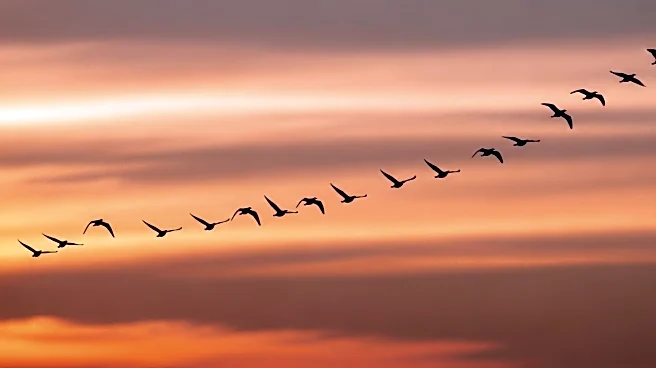What's Happening?
Scientists are raising alarms about the impact of climate change on bird migration patterns, which could have significant consequences for both avian species and human populations. According to experts, changes in climate are disrupting the traditional migration routes of birds, leading to a decline in their populations. This phenomenon is particularly concerning as birds play a crucial role in pollinating plants, with approximately 5% of plants relying on birds for pollination. The decline in bird populations could therefore lead to a decrease in food production, affecting global ecosystems. Notably, species such as the Red Knot, Swainson’s Thrush, and Black-throated Blue Warblers in the U.S. have been impacted, with their numbers dwindling due to insufficient food supplies along their migration routes. The National Audubon Society has warned that 389 North American bird species could face extinction within the next 50 years.
Why It's Important?
The decline in bird populations due to altered migration patterns poses a significant threat to global food security. Birds are essential for the pollination of various plants, including those that produce cash crops like coffee and chocolate. A reduction in bird numbers could lead to a decrease in the production of these crops, impacting economies that rely heavily on agriculture. Additionally, the loss of bird species could disrupt ecosystems, leading to broader environmental consequences. The situation underscores the interconnectedness of climate change, biodiversity, and human livelihoods, highlighting the need for urgent action to mitigate climate impacts and preserve avian habitats.
What's Next?
Efforts to mitigate the impact of climate change on bird populations may include measures to protect and restore habitats, as well as initiatives to reduce light pollution, which can disorient migrating birds. Conservationists and policymakers may need to collaborate to develop strategies that address the root causes of climate change while also supporting biodiversity. Public awareness campaigns could also play a role in encouraging individuals to take actions, such as setting up bird feeders and baths, to support migrating birds. The scientific community may continue to monitor bird populations and migration patterns to better understand the long-term effects of climate change on avian species.
Beyond the Headlines
The decline in bird populations due to climate change raises ethical and cultural questions about humanity's responsibility to protect biodiversity. Birds have cultural significance in many societies, and their loss could impact cultural heritage and identity. Furthermore, the situation highlights the ethical imperative to address climate change not only for the sake of human survival but also for the preservation of other species. The potential extinction of numerous bird species serves as a stark reminder of the broader ecological impacts of human activities and the need for sustainable practices.










